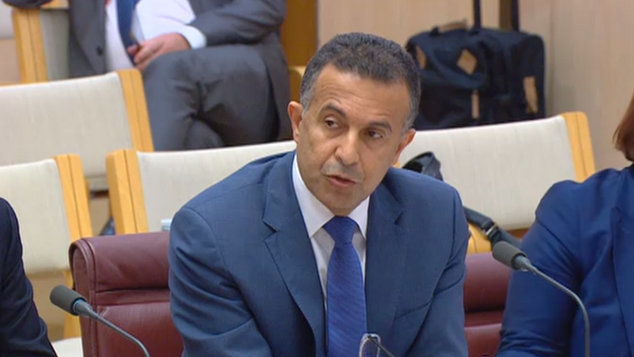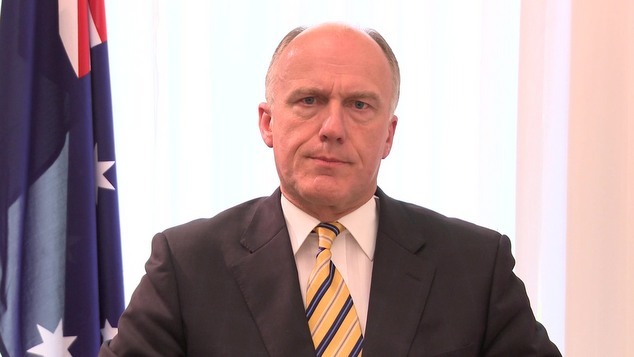
Liberal senator Eric Abetz has grilled SBS CEO Michael Ebeid over his support for marriage equality, suggesting that the broadcasting boss spent too much time campaigning against government policy.
Ebeid was appearing before a Senate Estimates committee yesterday when he and his staff faced a barrage of questions about his personal emails.
Senator Abetz questioned Ebeid about his decision to sign an open letter to the Prime Minister calling for marriage equality. The letter which was organised by Australian Marriage Equality featured many prominent business leaders.
“How did you come to sign this letter?” Senator Abetz asked.
Ebeid said he had signed the letter in a personal capacity, noting that it was clearly declared as such in the text of the letter.
Senator Abetz inquired if the SBS boss had been involved in the drafting of the letter, to which Ebeid responded that he had not been involved in the writing of the statement.
“So how did you come to know of the existence of this letter for you to add your signature?” Senator Abetz asked.
“I think the Australian Marriage Equality contacted several CEOs to see if they were interested in supporting such a letter. I think marriage equality is an important issue for me, and I thought it was important to sign it.” Ebeid responded.
“Clearly it’s an important issue for you,” Senator Abetz said, “but keeping in mind your on the tax payers stipend with a public authority, that is also a broadcaster.”
Senator Abetz questioned why SBS had denied a Freedom of Information request from his office to release all documents relating to Ebeid’s correspondence relating to his involvement in the letter, and asked how many documents were involved in his FOI request.
SBS’s Director of Corporate Affairs, Clare O’Neill told the committee that the FOI request covered around 55 documents.
Senator Abetz asked if the emails sent by Ebeid included his signature block identifying him as the CEO of SBS.
The CEO noted that every employee at SBS was permitted to use their email for a reasonable amount of personal use, and there was no requirement to remove their contact details from personal emails.
“Every employee at SBS, including myself, is well and truly entitled to send a reasonable amount of personal emails, that’s not unusual. I think any organisation has a reasonable use policy for personal emails.”
Ebeid said even if his email block was at the base of an email it could still be considered a personal email.

“Well, that’s news to me.” Senator Abetz said. “I can now sign off as Senator for Tasmania and make it a personal one, interesting concept of managerial responsibility.”
Senator Abetz asked how many of Ebeid’s emails relating to his signature on the letter of support for marriage equality contained his email block. To which O’Neill said she did not have the documents with her and would have to take the question on notice.
“Are you telling us you can not recall what was on those fifty or so emails that you have personally seen, and gone through in detail, so you can refuse them to my office. That you can not recall the signature block on the bottom of them?” Senator Abetz asked.
O’Neill said she would need to check the documents before she could give an answer, which lead to the Tasmanian senator repetitively questioning why she was unable to provide him with an answer.
“I’m asking you, are you honestly telling this committee that you can not recall whether any of them were so signed off.” asked Senator Abetz.
“I’m asking you why you are taking on notice, and keep in my you are on oath in these committees, so are you telling us honestly, that you cannot recall any of those documents having that signature block on the bottom of it.” Senator Abetz reiterated.
“Honestly Senator I can not recall, and I would not want to mislead the committee, which is why I am taking it on notice.” O’Neill answered.
Senator Abetz suggested that Ebeid was only able to be a signatory on the letter due to his position as the head of SBS.
Ebeid hit back saying, “Senator I think you’re drawing a incredibly long bow.”
“If the first paragraph says ‘I am signing this letter in my personal capacity’, as a 30 year businessman that is saying that I think this matter is important to business, as indeed 32 other leading CEO’s in the country, leaders of some of the biggest companies in Australia believe this is important to their companies, to their employees, and we all signed it in our personal capacity – I’m not sure what the problem is here?”
“You needed worry about that. I’m asking the questions. I’m seeking answers.” Senator Abetz said. “Let’s stick to that process.”
Ebeid told Senator Abetz if he understood what his concern was, he would be able to help him find answers.
“That’s none of your concern.” Senator Abetz said. “Your concern is to answer the questions honestly and truthfully as they are put to you.”
Senator Abetz went on to ask Ebeid about his inclusion in the Australian Financial Review’s 2016 list of 50 Outstanding LGBTI Executives. Senator Abetz asked if the SBS boss was aware he was included in the article.
“I think you’ll see my photo on the front cover there Senator.” Ebeid said.
Senator Abetz said indeed Ebeid’s image was on the cover and within the article, where he was listed as the CEO and Managing Director of SBS, rather than as a private citizen.
“That is my current job.” Ebeid answered.
“And you don’t mind that being associated with you personal campaign in relation to changing the law?” Senator Abetz asked. “You don’t mind having your official role, funded by the tax payer, being associated with your personal campaign to have the law of this country changed in a particular area.”
“Senator, every person in the country has a personal view on various issues.” Ebeid responded. “Just because I’m employed by SBS, it doesn’t mean I have a lobotomy of my personal views.”
“I’m still allowed, and I thought you as a senator that advocated for free speech would have certainly understood, that in my personal capacity I’m more than entitled to have a personal view on a number of issues.”
Senator Abetz said he had not argued otherwise, but was merely interested in Ebeid’s role as a “tax payer funded person” who used his position for advocacy.
“The answer is yes.” Ebeid said. “I’ve been an advocate for marriage equality long before I joined SBS, and I will continue to be an advocate for marriage equality.”
Senator Abetz said Ebeid was using his tax payer funded position to help the marriage equality campaign, an assertion that the SBS boss said he disagreed with.
Later Nationals Senator John Williams asked Ebeid why he thought the issue was important from a business perspective.
Ebeid said like many business leaders he thought it was important that business speak up for their diverse range of employees.
“When you have experienced discrimination over a prolonged period of time, it does affect your mental state,” Ebeid said. “And when you come to work, you don’t get to leave depression, anxiety, feelings of discrimination behind at the door.
“So it does affect employees – their productivity levels, how confident they feel at work. So you’re not able to bring your whole self to work. And that’s why so many CEOs … think this is a very important issue to the bottom line.”
Later in the day Senator Abetz released an statement saying he believed the hearings had shown that the SBS CEO had used government resources to promote his personal political beliefs.
“Taxpayers pay Mr Ebied more than $660,000 per year and they expect him to focus on doing his job,” Senator Abetz said.
“The fact that there are 55 emails between Mr Ebied, his office and others relating to this political campaign demonstrates that there was heavy personal involvement from his taxpayer funded office in this politically charged campaign to lobby the Prime Minister.”
Senator Abetz said he would continue to ask for SBS to release Ebeid’s personal emails to his office.
OIP Staff




